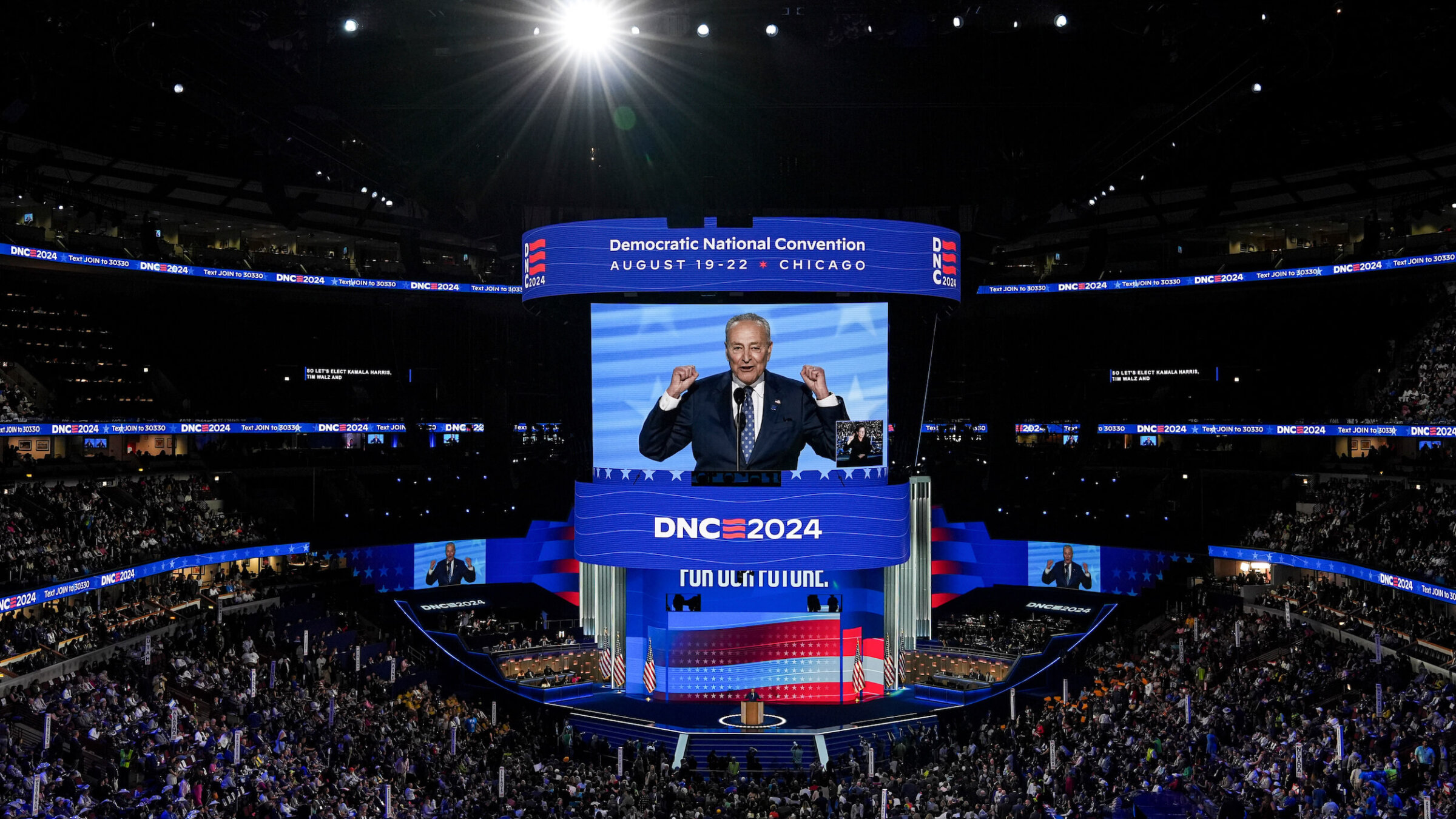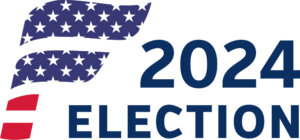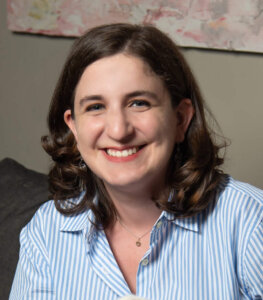American Jews have never been more divided. At the DNC, unity is back on the table
Political differences have caused rifts in our community since Oct. 7. The DNC is a reminder that our pluralism is our strength

Sen. Chuck Schumer speaks during the Democratic National Convention at the United Center in Chicago. Photo by Al Drago/Bloomberg/Getty Images
Over the past 10 months, arguments over what it means to be Jewish have caused heartbreak in the United States.
 We have clashed over so many questions. What are Jewish values? What is antisemitism; where does it come from; how should we fight it? We have criticized each other as being unserious Jews, or not real Jews, over political differences, all the while wondering how anyone could feel differently than we do.
We have clashed over so many questions. What are Jewish values? What is antisemitism; where does it come from; how should we fight it? We have criticized each other as being unserious Jews, or not real Jews, over political differences, all the while wondering how anyone could feel differently than we do.
Pluralism means difference, which means infighting — particularly in the Democratic Party, the political home of somewhere between 60 and 70% of America’s Jews. Except this week, as Jews of all different ilks — different levels of observance, different political values, different approaches to interfaith relationships — have gathered in Chicago at the Democratic National Convention. In this way, the DNC has been refreshing: A moment in which a diverse display of Judaism has come across as a strength, not a warning of discord to come.
The sense of prevalent infighting has long been a feature of American Jewishness, but it’s been especially clear in the wake of Hamas’s Oct. 7 attack and during the 10 grueling months of Israel’s war against Hamas in Gaza, which has killed, per the Gaza Health Ministry, more than 40,000 Palestinians. Some American Jews have rallied for Israel; others have protested against its war. Relationships of all kinds have fractured under the pressure of different beliefs about the Jewish state, and its role in American Jewish life.
Not so at the DNC. Yes, it’s possible that this is because mentions of Israel have been few and far between, and yes, there is a degree to which Democrats are dancing around differences of opinion. Elected Jewish officials within the Democratic Party still disagree over what policy should be regarding Israel. Some stepped out to call for a ceasefire in November, and others have signed letters to President Joe Biden calling on him to not undermine Israel. Leftist Jewish groups like Jewish Voice for Peace and IfNotNow, which have long protested Congress calling for a ceasefire, have been outside the convention calling for an end to the war.
And American Jews continue to go back and forth about the extent to which the Democratic Party has a problem with antisemitism related to the war, and what to do about it. (Former President Donald Trump has tried to make political hay from these divisions, and has repeatedly said that Jews who vote for Democrats should get their heads examined, a phrase that many feel is itself antisemitic and offensive.)
But none of that is at the forefront of this week’s convention. Instead, in the spotlight, are all kinds of Jews working together toward common goals — regardless of, and even empowered by, their differences. Jewish diversity has been so baked into the programming that it would be easy to take it for granted, which makes it all the more remarkable.
I’m not referring to the side events typically held explicitly for American Jews, although there have been plenty in Chicago, held on subjects like “the American Jewish community and Israel after Oct. 7. ” Nor do I mean the attendance of representatives of particular Jewish organizations, like the Orthodox Agudath and Chabad, or religious figures, like Rabbi Michael Beals, known as “Joe Biden’s rabbi,” and Rabbi Sharon Brous of Los Angeles.
All of that is, basically, normal. What’s notable this year is how many Jewish politicians and political actors are drawing on American Jewish traditions, and interpreting and sharing Jewishness, before our eyes on the DNC stage.
The Democratic Party, American Jews, and Democratic Jews have spent months fighting bitterly over antisemitism and what it means to have Jewish political representation. Over the course of this week, we could see so clearly that it doesn’t mean any single thing; that there is space in our discourse for multiple interpretations, and that we don’t always need to demonize those who think differently than we do.
On Monday night, there was Rep. Jamie Raskin of Maryland, vehemently defending the U.S. constitution and American liberal democracy, part of a history of American Jews who have expressed Jewish particularity by defending constitutional liberalism.
At a side event, there was June Rose, an ex-Orthodox Jewish delegate of the Uncommitted movement, who aims to pressure Vice President Kamala Harris’ presidential campaign into ending support for Israel’s war against Hamas in Gaza, part of the long (if sometimes overlooked) American Jewish tradition of criticizing Zionism and Israel.
On Tuesday night, there was Sen, Bernie Sanders, who called for an end to “this horrific war on Gaza” and spoke about the working class and economic rights, like so many Jewish labor leaders and organizers and protesters before him. He also spoke out against big money in primary elections “for the sake of our democracy,” a likely knock on, among others, the American Israel Public Affairs Committee, whose primary spending in primaries he has described as “simply outrageous.”
There was Senate Majority Leader Chuck Schumer, the highest-ranking elected Jewish official, who invoked his status as such and said “I want my grandkids and all grandkids to never face discrimination because of who they are. Donald Trump, this is the guy who peddles antisemitic stereotypes. He even invited a white supremacist to Mar a Lago.”
There was Doug Emhoff, Harris’s husband, who, like a third of American Jews (and 60% who were married between 2010 and 2020), is in an interfaith marriage. In his Tuesday night speech, Emhoff spoke of his adolescent Hebrew school attendance and declared that his marriage to a non-Jewish woman connected him more deeply to his own faith. (Jewish delegates held up “Doug for First Mensch” signs.)
On Wednesday night, there will be Pennsylvania Gov. Josh Shapiro, who will likely speak — as he frequently does — about how his religious tradition guides him in public service. “I lean on my family and I lean on my faith which calls me to serve,” he said at a rally in Pennsylvania earlier this month. “And I am proud of my faith!”
There are those behind the scenes, too, like Adam Frankel, Harris’s lead speechwriter and the grandson of Holocaust survivors, who has spoken about how the Holocaust “hovered over” his upbringing, and how he feels its lessons include remaining “vigilant about democracy.”
Of course, the DNC hasn’t been free of conflict. Jewish side events have reportedly been carefully guarded out of fear of security risks, and anti-Zionist protesters showed up to a conversation on antisemitism by Agudath, a move some criticized as antisemitic. Shapiro fielded questions from reporters about whether antisemitism played a role in Harris’s decision not to select him as her running mate; he insisted that it didn’t, but also told CNN that there is antisemitism in the Democratic Party.
But although Jewish pluralism means there are many ways to get your heart broken in argument — as so many of us have experienced since Oct. 7 — it also means there’s no one way to participate in American politics as a Jew in the United States. I can see why some might trade the gift of being able to be any kind of Jew you please for greater group cohesion, but I wouldn’t.
Like many others, I have, over the last 10 months, been insulted and applauded, agreed with and derided, for what I’ve written and said about Jews and Jewish politics. I don’t expect that to stop. People feel passionately about identity. People want to feel safe and secure, and they want people to agree with them; Jews are no exception to this.
It can be a painful process. It’s exhausting. But I’ve realized, watching the DNC, that I would rather have and lose a thousand arguments about Jewish pluralism than give it up.

















